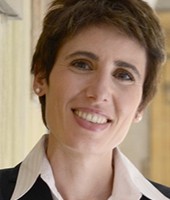Anna Marmodoro
Anna Marmodoro is currently an Official Fellow of Corpus Christi College, in the Faculty of Philosophy of the University of Oxford. She specializes in metaphysics and the history of metaphysics (particularly ancient, late antiquity and medieval). She also has strong research interest in the philosophy of science, philosophy of mind and philosophy of religion. She has published a number of books, edited volumes and articles in all these areas. She has directed a large-scale research project at the University of Oxford in ancient metaphysics titled Power Structuralism in Ancient Ontologies, with funding from the European Research Council (completed in March 2016). She is currently leading another project concerning the metaphysics of science titled The Metaphysics of Entanglement, with funding from the Templeton World Charity Foundation. Anna Marmodoro has previously held visiting research positions in Germany, Italy, Australia, and the US (Harvard).
Research interests
The nature of properties, dispositions, relations; composition and structure; fundamentality; the metaphysics of substance and causation.
Divide and Empower. The Metaphysics of Stoic Blends
That material bodies can be coextensive in space is a view that has enjoyed no favor in the history of philosophy. Yet, the Stoics held it. My project aims at investigating why they took this view, and what metaphysics they developed for it. My current hypothesis is that the Stoics posited unlimited division of body in order to account for how coextension of bodies in spacetime is possible. They posited coextension in order to adapt the account of causation they inherited from Aristotle to their physicalist premises. So they developed what I call Empowerment Model of causation: causal agents ‘interlock’ by co-location, enabling each other to use each other’s causal powers to do things they couldn’t on their own, without compromising each other’s natures. The Stoic model is an innovative and distinctive metaphysical account in the history of philosophy, different from Aristotle’s causal model; from Plato’s plural subjects model; and from the contemporary extended subjects model. This project aims to develop and test such research hypothesis. The project’s research will include: 1) a new interpretation of a key aspect of Stoic philosophy; 2) a better understanding of the role of colocation in ancient thought, by way of comparison/contrast of the Stoics with the Presocratic Anaxagoras; 3) a contribution to mereology on infinitesimal parthood relations.
Key publications
The Metaphysics of Relations (co-edited with David Yates), Oxford University Press, 2016, 304 p.
Causation and Creation in Late Antiquity (co-edited with Brian D. Prince), Cambridge University Press, 2015, 312p.
Aristotle on Perceiving Objects, Oxford University Press, 2014, 304 p.
The Author's Voice in Classical and Late Antiquity (co-edited with Jonathan Hill), Oxford University Press, 2013, 448 p.
The Metaphysics of the Incarnation (co-edited with Jonathan Hill), Oxford University Press, 2011, 262 p.
|
Workshop organized by A. Marmodoro, Paris IAS fellow |
|
Oxford University Press |
|
|

